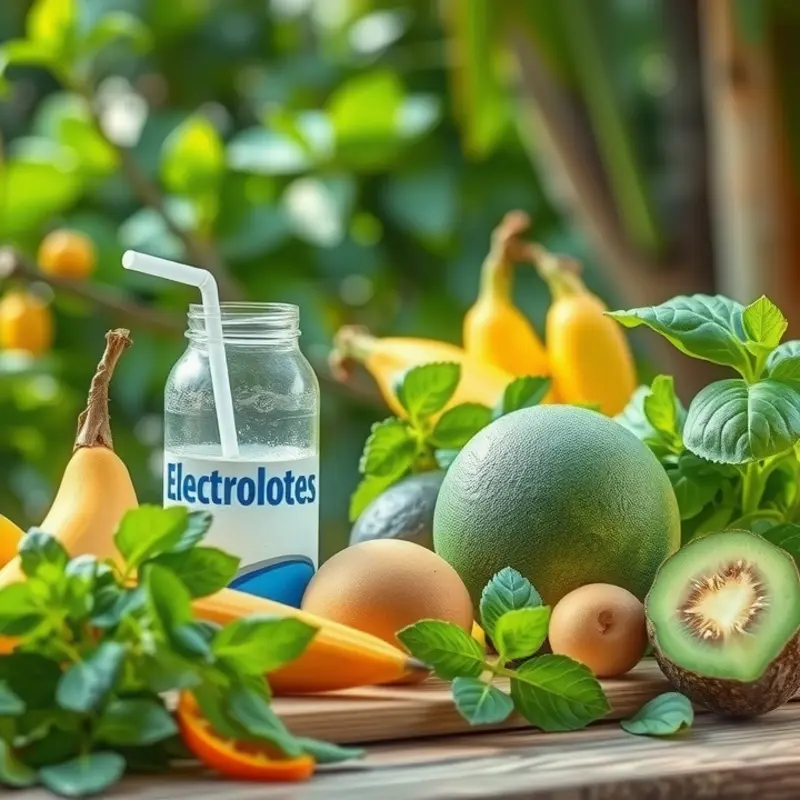Electrolytes are vital components that play a significant role in maintaining the body’s fluid balance, nerve function, and muscle contraction. For health-conscious adults exploring dietary choices, understanding electrolytes is crucial for optimizing nutrition. This article delves into what electrolytes are, their importance, and how to effectively incorporate them into your daily diet for enhanced performance and well-being.
Understanding Electrolytes: The Basics

Electrolytes are pivotal components in our bodies, functioning as electrically charged minerals. These minerals, including sodium, potassium, calcium, magnesium, bicarbonate, and chloride, play significant roles in maintaining various physiological processes. Understanding the basic nature of these electrolytes is vital for appreciating their influence on our health.
Sodium, often highlighted in discussions about blood pressure, helps regulate fluid balance and supports nerve and muscle function. It’s predominantly found in table salt and processed foods. An imbalance, particularly excess sodium, can lead to hypertension and strain the cardiovascular system.
Potassium balances sodium in our bodies, ensuring proper muscle contractions and nerve signals. It is abundantly available in bananas, oranges, and sweet potatoes. A deficiency in potassium may cause muscle weakness and abnormal heart rhythms, which underscores the importance of balanced intake.
Calcium, aside from building strong bones and teeth, plays a key role in blood clotting and muscle contractions. Dairy products, leafy greens, and fortified foods are typical dietary sources. Low calcium levels can result in brittle bones, a condition known as osteoporosis.
Magnesium is crucial for over 300 enzymatic reactions, including those involved in energy production. Found in nuts, seeds, and whole grains, insufficient magnesium intake may lead to muscle cramps, mental disorders, and osteoporosis. It is an essential nutrient that supports heart health and maintains our biochemical equilibrium.
Bicarbonate acts as a buffer, maintaining the pH balance in our blood. While not directly consumed, the body produces bicarbonate as part of its acid-base regulatory functions, protecting us from conditions such as metabolic acidosis and alkalosis.
Chloride, often paired with sodium, helps maintain fluid balance and is involved in producing stomach acid, crucial for digestion. It is typically consumed alongside sodium in table salt. Imbalances are rare but can affect the body’s ability to maintain homeostasis.
Reflecting on these roles, it becomes apparent how vital balanced electrolyte levels are for our overall health. Imbalances, whether in excess or deficiency, can lead to severe health issues. It’s crucial to consume a well-balanced diet that supplies these essential nutrients in appropriate amounts.
For those looking to enhance their diet without increasing sodium intake, consider exploring options that offer flavor without salt. A variety of herbs and spices can transform meals, offering both taste and nutritional benefits. More practical guidance can be found by exploring ways to boost flavor without added salt.
A deeper understanding of electrolytes and maintaining a diet that fosters balanced intake can offer significant health benefits. Integrating this knowledge into daily dietary decisions promotes better well-being and helps prevent chronic health issues associated with electrolyte imbalances.
Incorporating Electrolytes into Your Diet

Electrolytes are the body’s essential conductors of electricity, supporting crucial functions from nerve signaling to hydration. Incorporating electrolyte-rich foods into your daily meals ensures you’re fueling your body with these vital nutrients. Key Electrolytes include sodium, potassium, calcium, and magnesium, each supporting different aspects of health.
To effectively integrate these elements, prioritize whole foods known for their high electrolyte content. Fruits like bananas and apricots are excellent sources of potassium, while citrus fruits and berries provide necessary calcium. Leafy greens such as spinach and kale, as well as nuts and seeds, are packed with magnesium. Including these foods in smoothies or salads is a quick way to boost your electrolyte intake.
Hydration is another crucial factor. Drinking water infused with a pinch of sea salt or squeezing a lemon can enhance your water with sodium and potassium. Additionally, coconut water serves as a natural sports drink with its balanced electrolyte profile.
For those who lead an active lifestyle, timing your intake can make a difference. Consuming electrolyte-rich foods or beverages before and after workouts can help maintain muscle function and prevent cramps. Preparing meals with a blend of these ingredients can ensure you’re replenished and ready for your next session.
Snacks are an often overlooked opportunity to boost electrolytes. Consider trail mixes that include nuts and dried fruits, or yogurt topped with granola and sliced fruits for an extra electrolyte kick. Incorporate dairy products like milk and cheese as they offer a good source of calcium, essential for bone health.
When considering supplements, it’s important to consult a healthcare professional, particularly if you engage in intense physical activities or follow a diet that might not meet your nutritional needs. For sustainable habits, integrating these foods naturally into your diet is often more beneficial than relying on supplements alone.
Balancing your intake is essential. Too much sodium, for instance, can lead to hypertension, while excessive potassium can strain kidney function. Hence, aim for a varied diet that mirrors nutritional adequacy guidelines, ensuring you’re not overloading on a single electrolyte.
Embrace practical meal planning strategies to simplify incorporating electrolytes into your routine. Preparing staple ingredients in advance, such as roasted vegetables and cooked grains, can offer a convenient base for a variety of meals rich in diverse electrolytes. For more on prepping efficiently, check out minimal prep dinner ideas.
Ultimately, incorporating electrolytes into your diet is about understanding the role each one plays and making informed food choices. With mindful integration, you can enhance your health, improve your energy levels, and support your body’s essential functions every day.
Final words
Electrolytes are not just essential for athletes—they are crucial for everyone striving for optimal health. Understanding their role and sources can profoundly impact energy levels, muscle performance, and overall well-being. By incorporating a diverse range of electrolyte-rich foods and staying mindful of your hydration needs, you can enhance your nutrition and support your body’s functions. Make informed dietary choices and enjoy the benefits that these vital nutrients bring.







